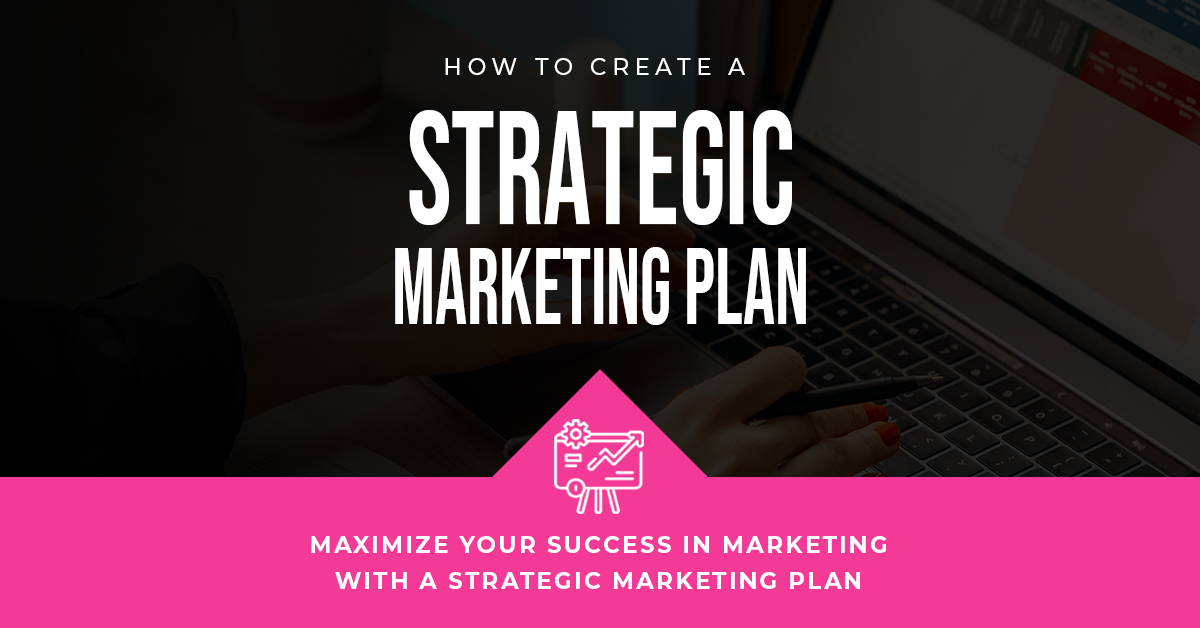Maximize the potential of your enterprise with a masterfully crafted strategic marketing plan. A well-executed approach to your strategy can result in flourishing success, attract customers, and bring your business to unprecedented levels of achievement.
But not just any marketing strategy will suffice. It requires a shrewd approach that optimizes your assets, connects with your intended audience, and yields fruitful outcomes.
Here’s how to design a successful strategic marketing plan.

Establishing Definitive Objectives
A paramount step in a strategic marketing plan lies in the art of defining goals and objectives. This clarifies the direction and imbues a sense of purpose in your marketing efforts.
When embarking on this journey, consider both your proximate and long-term aspirations.
Contemplate what you hope to accomplish through your marketing endeavors – be it elevating sales, amplifying brand recognition, or expanding your reach. Every marketing plan will differ based on your goals.
To ensure your objectives are quantifiable, use metrics that are specific and measurable such as revenue growth, market share increase, or customer acquisition rate.
Comprehending Your Target Market

The foundation of a successful marketing plan is a deep understanding of your target audience. Delving into their intricacies, such as preferences and behavior, is crucial.
Gather data and insights about your target market to create a buyer persona, which will allow you to personalize your messaging and deliver content that resonates with them. Consider their pain points and challenges, and position your offerings as a solution.
Analyzing the Competition
To maintain a competitive edge, it is imperative to understand your competitors and their marketing strategies.
Conduct a competitive analysis to uncover their strengths and weaknesses and understand their market positioning. Observe their target audience, pricing strategy, and marketing channels, and use this information to differentiate yourself and position your brand in a unique manner.
Selecting Effective Media
With an abundance of marketing channels available, choosing the right ones can be a daunting task. Align your choices with your goals and target audience to increase the chances of success.
For instance, if you’re targeting a younger demographic, consider utilizing social media platforms such as Instagram and TikTok. Conversely, if your target audience is older, consider traditional media such as television or print advertising.
Additionally, consider the cost and resources required for each channel, and opt for those that will provide the highest return on investment.

Track and Modify with Precision
A vital aspect of a strategic marketing plan is tracking and measuring your outcomes to assess performance. Keeping a close eye on your metrics, such as conversion rates, click-through rates, and return on investment, provides valuable insights that can inform your decision-making.
The ability to make informed modifications based on your data can be the difference between a lackluster marketing plan and a successful one.
Regular monitoring and evaluation enable you to tweak and optimize your approach, ensuring you stay on track towards your goals and objectives.
Uncover Your Unique Differentiating Factor
In today’s highly competitive marketplace, it is imperative to distinguish your business from the rest of the pack.
A unique selling proposition (USP) is your business’s defining characteristic, what sets it apart from the competition and makes it truly exceptional.
Whether it’s providing unparalleled customer service, offering innovative products, or committing to sustainability, identifying and leveraging your USP is critical to the success of your marketing plan.
Allocate Assets Intelligently
Successful marketing requires adequate funding and resources. The allocation of assets can make or break your marketing plan.
It’s crucial to determine your budget and prioritize your investments, opting for channels that have demonstrated potential and have the greatest chance of driving results.
Continuously evaluate your investments, and be prepared to adjust your budget accordingly, to ensure you’re making the most impactful investments.
Construct a Compelling and Cohesive Content Strategy
The heart of any marketing plan is a compelling content strategy. Determine the type of content that will engage and resonate with your target audience, the optimal times for creating and distributing it, and the best channels for reaching your audience.
Your content should foster a connection with your audience, appealing to their interests and needs, and differentiating your business from the competition. A strong and cohesive content strategy will help you build trust and establish your brand as a thought leader in your industry.
Take Dynamic and Data-Driven Action
Bringing your marketing plan to life requires dynamic and data-driven action. Execute your plan, track your outcomes, and continuously adjust and optimize as necessary.
Staying focused and on track is essential to ensuring your marketing plan achieves the desired results. The ability to pivot and make changes based on data and insights is what sets a successful marketing plan apart from one that falls short.
Measure Your Markers of Success

Measurement and evaluation are key to the success of your marketing plan. Regularly monitoring your progress, using data and metrics, enables you to determine what’s working and what’s not.
Keeping an eye on your milestones and performance indicators, such as sales growth, customer acquisition rates, and brand recognition, provides valuable insights that inform your decision-making.
The ability to measure and evaluate your progress is what drives success and propels your marketing plan forward.
Let’s recap through 3 FAQs about strategic marketing plans ⟶
FAQ #1: What is a Strategic Marketing Plan?
A Strategic Marketing Plan is a comprehensive roadmap that outlines your business goals and the steps necessary to attain them. It serves as the foundation of your marketing efforts, helping you stay focused and organized. This powerful tool is designed to help you maximize your resources and effectively reach your target audience.
FAQ #2: Why is a Strategic Marketing Plan important for my business?
A strategic marketing plan is crucial for your business as it enables you to allocate your resources efficiently, focus your efforts, and measure your progress towards your goals. It also helps you stay ahead of the competition and respond promptly to market changes. With a well-designed plan, you can increase your chances of success and grow your business.
FAQ #3: What are the key components of a Strategic Marketing Plan?
A well-structured strategic marketing plan includes a clear description of your target audience, your unique selling proposition, your marketing budget, and a timeline for executing your marketing activities. Additionally, it includes a detailed analysis of your competition and a comprehensive plan for how you will measure your results. These elements work together to ensure your marketing efforts are aligned with your goals, target the right audience, and effectively allocate your resources.
Utilizing a well-structured marketing plan can unleash the full potential of your business, propelling it to new heights. However, not just any marketing plan will do, it requires a smart strategy that maximizes your resources, resonates with your target audience, and delivers results.
FAQ #4: How do I put a Strategic Marketing Plan in action?
To create a winning marketing plan, start by setting clear goals, defining and understanding your target audience, and studying the competition. Take what you learn and choose effective channels and get to work. Then, monitor and adjust regularly. Before you commit, you should also discover your unique selling proposition, allocate your resources wisely, and craft your killer content strategy.
Tee up. Take action. Track your triumphs.
With measurement and analysis playing a critical role in the success of your plan, you’ll be able to make informed decisions and adjust as necessary. Remember, a successful marketing plan demands a budget and a commitment to regularly review your progress and pivot as needed.
By staying focused, keeping on course, and remaining flexible, you can create a strategic marketing plan that sets your business apart and drives success.





Write a Reply or Comment